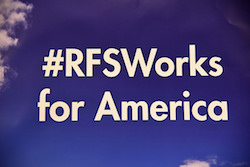 A new economic modeling study being published in the American Journal of Agricultural Economics finds that the “Renewable Fuel Standard (RFS) has substantially benefited the U.S. economy by lowering gasoline and crude oil prices, cutting crude oil imports, adding value to U.S.-produced agricultural commodities, and reducing U.S. greenhouse gas (GHG) emissions.”
A new economic modeling study being published in the American Journal of Agricultural Economics finds that the “Renewable Fuel Standard (RFS) has substantially benefited the U.S. economy by lowering gasoline and crude oil prices, cutting crude oil imports, adding value to U.S.-produced agricultural commodities, and reducing U.S. greenhouse gas (GHG) emissions.”
“The results confirm that the current RFS program considerably benefits the agriculture sector, but also leads to overall welfare gains for the United States,” according to the study’s authors, Iowa State University economists GianCarlo Moschini, Harvey Lapan, and Hyunseok Kim. “We find that the RFS has indeed proved to be a remarkably effective tool for farm support.”
The analysis found the RFS in 2015 saved the U.S. economy $17.8 billion in gasoline expenses, compared to a case where no RFS existed. That’s equivalent to $142 per American household. Gasoline prices were $0.18 per gallon, or 9.5%, lower because of the RFS. In addition, the RFS is responsible for increased federal tax revenues.
Further, the results highlight the impact of the RFS on domestic energy security, showing that “the RFS leads to a modest contraction in domestic crude oil production, and a larger decline in imports of crude oil.” According to the study, crude oil imports were nearly 200 million barrels lower in 2015 than if the RFS did not exist. Meanwhile, domestic crude oil production was only 0.3% lower in the “2015 RFS” case than in the “no RFS” case.
“The results that we have presented confirm that the current RFS program considerably benefits the agriculture sector,” write the authors.

